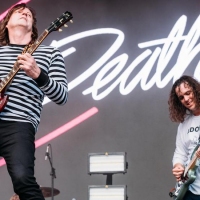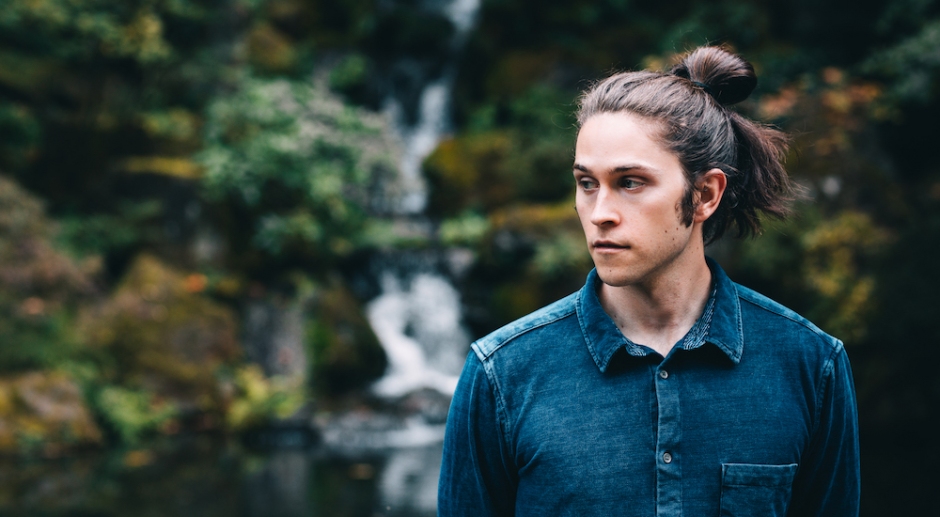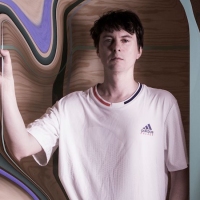 From The Wiggles to DZ Deathrays, Murray Cook isn't going anywhereThe Red Wiggle's latest venture, The Soul Movers, just dropped a DZ Deathrays-featuring film clip.
From The Wiggles to DZ Deathrays, Murray Cook isn't going anywhereThe Red Wiggle's latest venture, The Soul Movers, just dropped a DZ Deathrays-featuring film clip.

Big Wild on the risks and challenges of his debut album, Superdream
The Portland musician branches out into the future on his first record, out today via Counter Records/Inertia Music.
Header photo and in-article photo by Little Green Eyes.
Tracking the growth and evolution of Big Wild over the last few years is an exciting task. The Portland-raised producer, real name Jackson Stell, has been at the forefront of the post-Soundcloud electronic world, initially causing a stir with his glistening break-out single Aftergold - released as one of ODESZA's Foreign Family Collective's first releases, and then again with Swedish popstar-on-the-rise Tove Styrke - before dedicating much of the last three years on personal and musical maturity and development. In the time since, Stell has continually proved himself as an artist pushing the boundaries within electronica, combining the glistening vocals of guest stars - NYC vocalist iDA HAWK, Malaysian singer-songwriter Yuna and US boundary-pushers Hundred Waters among them - with bright, expansive productions that bridge the gap between 'traditional' electronic music and something instrumentally-intwined; something that his long-awaited debut album Superdream brings to the forefront.
Released today via Counter Records/Inertia Music, Superdream is a comprehensive and versatile release that encompasses his past work while throwing a hint at the future, injecting his trademark, synth-driven euphoria with moments more tender and emotive, highlighting years of challenge, learning and risk-taking. Perhaps the most obvious example of this is Stell's drive to further introduce who he is - musically, as an artist; and emotively as a person - into the Big Wild project through the introduction of his own vocals, stepping forward as the album's primary vocalist, songwriter and lyricist after finding his footing with guest-writers and vocalists. City of Sound, the album's nostalgic, disco-tinged opener, combines a pitched vocal with thick bass kicks and crisp handclaps while Heaven, towards the latter end of the album, brings this pitched vocal together with a more euphoric and upwards-looking edge. Maker, another vocal-led album cut, unites a more subtle and delicate vocal with playful melodies and a slight funk pulse while elsewhere his vocal takes other forms; album highlight Joypunks seeing Stell cut-and-chop his vocal around the catchiest beat of the record.
In turn, the album is more laced with his personality and experiences, bringing the moments, feelings and memories that have defined Stell's life thus far and pushing them into the album in a way none of his past work really ever did. Maker, for example, is about "overcoming a difficult period of your life with a new and positive perspective," while City of Sounds feels like a therapeutic cry into the skies ("Empty your lungs as we shout to the stars / Say your grace in the city of sound"). "Superdream is something I needed to do - albeit the most difficult project I’ve pursued," he says on the record. "It felt like all the creative roads I had taken in music led me to deciding I want to sing and write. This decision gave me the voice and musical identity I had been searching for all along. It marks a new chapter in my music, one that is more ‘me’ than anything else I’ve released. I’ve realised that might have been my goal all along."
Listen to the album below and underneath, read our interview with Big Wild, where we talk about the album's creation, the risks and challenges that shaped its birth, and his experiences with thyroid cancer in 2013, which in a semi-recent Instagram post, he talked about having completely recovered: "It gives me the courage to try new things and push myself."
You've been making music for a while now, at what point did putting out a Big Wild album feel like the next step?
It felt the next step shortly after I put out the EP. I was in the process of trying to work with Soundcloud a few years ago and always putting out singles, but then when I put out the EP project, it felt like the only way to really establish my artistic identity from there was through a larger body of work - an album. It just felt like the natural next step, even though you know a lot of people would say that 'yeah, the album is kind of an antiquated format and what not nowadays', but I think it still has a lot of relevance in establishing who you are as an artist.
It also helps me stop feeling like every song has to be a single. They're able to be something more specific that might not resonate with as many people because it doesn't have that grand appeal, but it helps build who you are as an artist.
For sure. I feel like only doing singles and EPs can feel really confining too, while with an album, you have the room to do everything you want to achieve.
Yeah. It felt like there was more room to create a more well-rounded project.
The debut album is obviously a massive undertaking and there's like so much unfamiliarity comes with it. Because of that, I know it's something, especially in electronic music, that a lot of musicians and producers struggle with. What were your experiences with writing the album?
It was definitely the hardest project I've ever worked on. It's obviously a lot of music to make, but even outside of that, there's trying to make cohesive imagery for the project; trying to create an awesome overall vibe, and trying to make sure the songs all work together. There are so many angles to creating a good project, and yeah, it's really hard.
I had also never made an album before, and it's so much harder than just making a single and putting it out, or making a few songs and putting them out together as an EP. Never before I've been like 'yeah, I'm going to make all this music, sit on it for a while, and then try put it out altogether.' It was a huge challenge.
How did you overcome that challenge of trying to create something that was cohesive?
I think one of the main things I did was trying out with friends to pick up the guitar, which I've never really played before, and just experiment with it. That was completely new for me and I think using a new instrument gave me a lot of new and fresh ideas that I might not have otherwise come up with if I was just with the keyboard - it was important in keeping myself excited, curious and interested.
Then, I think the bigger thing to make it all cohesive, was having a clear direction on the album and knowing that I wanted to share more of me as a person; more of my story, my songwriting and my vocals. That was kind-of the unifying factor for me - introducing my voice; introducing a new element and really share more of who I am. I wrote all the lyrics after past experiences of my life because I feel like naturally, that would create something cohesive - it all comes from the same place. Just having a few new things to experiment with and having a central focal point helped me really power through the whole process of writing the album.
I was reading about your diagnosis of thyroid cancer. Was that what gave you that courage to stand up and dive more into doing vocals and working with more instruments? Did it provide that push?
I guess it did in a way. I feel like after that experience, it made me more willing to take risks and to not be as concerned about 'messing up my career' or something like that. It gave me the push to try something new and if it fails, oh well, it fails. Nowadays, doing something new and exciting regardless of the possible outcome appeals to me more than shying away from it and never really knowing what would've happened.
Maybe that experience helped me be comfortable trying all the new things that built the album. It gave me a better perspective on my life too. As much as I love music and as much as I love that part of my life, I have to be willing to take risks if I want to be happy doing it, and if it doesn't go perfectly or exactly how I want it, I have to be okay with that. That experience really helped me give me the courage and confidence to branch out a little and do things which ultimately shaped the whole album.
So what was the process of starting to sing and put your own voice on the album? Were you singing before then and it was more of a confidence jump? Or did you have to literally learn everything?
I was learning from scratch. I'd never previously sung before professionally, but I knew it was something that I really wanted to dive into 100%, so I connected with a vocal coach and went regularly. I was singing every day. It gave me a feeling that I felt when I first started to produce music; the more I learn, the more I get interested in it. It was a really inspiring thing for me to do, so once I started to get involved with it, I was able to build myself up what I thought to be pretty quick. I definitely have a history of people who sing in my family, but I've never tried it myself. But it was very nerve-wracking at times.
You said that your parents both sing and are both really musical musically involved, hey?
My dad was in a few bands in college, but he never pursued as a career. My mum has done choir basically her whole life and then my grandma was active as a singer in Chicago. That's really the extent of the music bond in my family - they've all been active within in it some way, but they all never really pursued it with career purposes like me.
They all seem very interested in music though, so you would definitely have been surrounded by music in your upbringing.
Yeah, for sure. The first time I really started to fall in love with music though was when I was making it and songwriting and composing it myself on the computer. Before then I liked it, but that's when I really loved it - when I really started to make a strong connection with it.

When it comes to the album's sound, there is some very forward-thinking and new stuff, but then you have songs like Pale Blue Dot, which is a lot more darker and I personally feel like it's more like your older stuff. Did you want this album to encompass everything you've done while also looking forward?
Yeah, I feel like a lot of the songs on this album signal a transition of kinds. I tend to always look forward too, so even what I was imagining the future to sound like for me, is actually different from this album and it's what I'm pretty sure I will probably be releasing in the next few years.
This album is almost like a transition to where I'm going. There's a lot of reference to my older instrumental stuff and it's something I still really enjoy making, as well as something I feel would be worth putting on the project. In saying that though, I do still feel like everything I make is like this transitioning to the next creative phase of my career. I think it's a mix of a few things that might sound like my older stuff, a few things that might sound like something you've never heard before, something that's in between. I try and get a spectrum of where I was and where I'm going, and I think this project is definitely a little more towards the side I'm going.
When you talk about like the next creative phase and where you think you're going, what are you envisioning?
At this point, having introduced my vocals and what-not, I think that's going to continue to be the central focus of my music - that, and figuring out new and interesting ways to combine my instrumental production ideas with my voice. I'm always striving towards creating a sound that's really unique to me and a sound that is a representation of who I am - for me, that is the ultimate creative goal, to make something that is the embodiment of who I am. That's always an ongoing process and where I'm always trying to go.
That being said, there are naturally some songs on the album that encapsulate that mood so to speak - production-wise, there's some work where I'm trying to look forward towards the sound I wanna do later on. I really enjoyed making a song where I feel like it alludes to something I want to do in the future.
You are the primary vocalist on the album, but you also have some a couple of collaborations on the album as well - iDA HAWK being a big one. Considering you now have that experience and that confidence putting you on vocals forward, was there any particular reason why you decided to still bring in guest vocals?
I knew I wanted a majority of the project to be me, as I thought it would be crucial on establishing my artist identity and making people know about this new thing I'm doing. That being said, when it came to the song that iDA HAWK ended up featuring on, I already had all the parts made in the production, but when I got to the chorus I just had this recurring idea of having a really powerful female singer, and she was the natural fit for that - which is something I obviously couldn't have done myself. Yeah, I want this project to feature my vocal heavily and be a statement for my vocals, but at the same time, I also know that bringing in other people can elevate some of these songs to a whole new level.
In regards to Rationale, that was a collab I've actually been trying to do for a while and when we finally had the chance, I sent over some demos and he was really excited to jump on and record something on it. What he sent me back, the vocals he came up with in the hook particularly, I was like, 'wow, this is so rad - this is like has to be on the album.' I still wanted other people to be on the album and I'm stoked with how they all turned out, so I'm happy.
Moving into your live show, you were here with Golden Features hey?
Yeah, I did Australia with him.
I just remember you have a lot of live elements in your show, and while it is definitely becoming more common via artists like RUFUS DU SOL and ODESZA, it's obviously still much easier and cheaper to tour an electronic act as a DJ set. What does having a live experience mean for you?
I think it makes the show more engaging and more interesting. There's also unlimited possibility you can do in the live show and so, on this next tour, I'm going to be trying out a tonne of new things - live vocals obviously - and it's like this whole new territory for me; the idea of a band going on stage with a guitarist, bassist and drummer. CDJs is just all figured out - there's not much you can do - but with live instrumentation in electronic music, it's all new, and we get to try and figure out ways to engage a crowd that is spontaneous and not predetermined like a DJ set.
I saw that Australia is your second biggest market outside of the US. Why do you think is?
To be honest, I couldn't give you an answer. I'm sure the tour helps a little bit, but there's a certain calibre of electronic seen in Australia and it's so good, and I think there's something sonically about my music that connects with this and connects with Australia. A lot of my favourite electronic acts and musicians are from Australia and it kind of makes sense to me that I might connect with people there, you know? I don't really know, all I know is wanna come back.
Big Wild's debut album, Superdream, is out now on Counter Records via Inertia Music. Buy it HERE.
Follow Big Wild: FACEBOOK
 From The Wiggles to DZ Deathrays, Murray Cook isn't going anywhereThe Red Wiggle's latest venture, The Soul Movers, just dropped a DZ Deathrays-featuring film clip.
From The Wiggles to DZ Deathrays, Murray Cook isn't going anywhereThe Red Wiggle's latest venture, The Soul Movers, just dropped a DZ Deathrays-featuring film clip.
 Panda Bear talks his new album Buoys and two decades of change in the music industryThe US musician and Animal Collective co-founder releases his sixth album, Buoys, today.
Panda Bear talks his new album Buoys and two decades of change in the music industryThe US musician and Animal Collective co-founder releases his sixth album, Buoys, today.